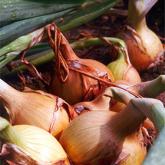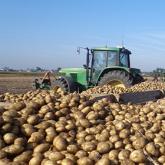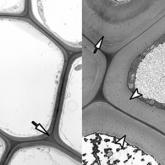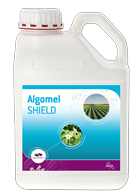AlgoMel Shield Reinforces plant structure
AlgoMel Shield is an extremely effective micronutrient formulation of copper that helps the plant to harden, to develop stronger, with more concentrated tissue through a process called lignification. The application rate is one of the lowest possible copper concentrations. AlgoMel Shield makes the plant less prone to stressful events from outside the plant.

The situation
Ripening of fruits
In modern farming where nitrogen is often supplied as a single nutrient there is a strong imbalance between nitrogen and copper. Nitrogen is responsible for ongoing production of fresh cell tissue, copper is responsible for ageing of tissue. Inadequate availability of copper increases the possibility of disease incidence.

The challenge
Building a shield
Making the epidermal cells strong enough to withstand stress from the outside depends on the right nitrogen copper ratio. By altering this ratio in favour of copper it is possible to start the lignification process, without sacrificing on crop quality and yield. Copper is responsible for ageing the tissue, it concentrates the carbon content in the plant, from juicy tissue to more rigid strong tissue and eventually (when you give it the time) to hard wood of trees.

The solution
Optimal resilience
As copper is not easily transported from the roots, even in case of high deficiencies, foliar application is the best solution. AlgoMel Shield is a formulation of copper with a natural organic plant complex. This special formulation makes it possible to use a minimum of copper ions, for the highest possible lignification effect. Stronger tissue is less prone to stressful events from outside the plant. WithAlgoMel Shield we achieve greener crops with more chlorophyll, slightly slower growth but with obviously less diseases.
Strong points
ALGOMELSHIELD, Seanergy technology/Cu
-
1
Makes the leaves stronger
-
2
Reinforces cell walls
-
3
Low effective copper dosage

The image on the left are normal cell wall. The image on the right is one with cell walls 6 weeks after having been wounded. A secondary cell wall is created as a response to the wounding. This wound tissue has a high lignin content (University of Hamburg).
Application for a better performance
How to use
|
|
General application rate: |
|---|---|
| As plant hardener |
0,5 l/ha in 80-500l of fresh water |
Packaging
Recommended products
Whether it is the stimulation of the overall vitality and boosting of hair roots in AlgoMelPush, or the switch from vegetative to generative development through AlgoMelProact, or the concentration hardening of the plant tissue with AlgoMelShield, all products in the range function in synergy with each other and together deliver crops that often overcome stress and diseases simply because they are vital and strong. The best result is obtained when all products are used in a program. The programme provides crop optimization through the leaf on top of the basic soil improvement and fertilization practices. Ask your adviser for the application program.
News

Official partnership between Olmix and Nileda to develop agriculture in Cambodia
11-10-2023PRESS RELEASE
Olmix received the visit from one of its major distributors in South-East Asia: the Cambodian-based company Nileda. The purpose of this visit was to formalize the collaboration in a partnership agreement. Thanks to this commitment, Nileda will benefit from daily technical monitoring of target crops such as durian, cashew nuts, cassava and rice, as well as marketing support and assistance with sustainable agriculture projects.

Olmix receives European PFC6 accreditation for its foliar biostimulant : Agroptim LAGOON
03-08-2023PRESS RELEASE
Olmix has taken a new step forward in the value of algae in agriculture. This technology has been patented and named SEALICA®. It activates the plant’s nutrition and defence mechanisms and substantially improves crop yields, as demonstrated by trials carried out on corn, winter wheat and potatoes.

SEALICA® : A new advance in algae patented by Olmix
07-07-2023PRESS RELEASE
Olmix has taken a new step forward in the value of algae in agriculture. This technology has been patented and named SEALICA®. It activates the plant’s nutrition and defence mechanisms and substantially improves crop yields, as demonstrated by trials carried out on corn, winter wheat and potatoes.
Local regulation should be consulted concerning the status of the product in the country of use.




